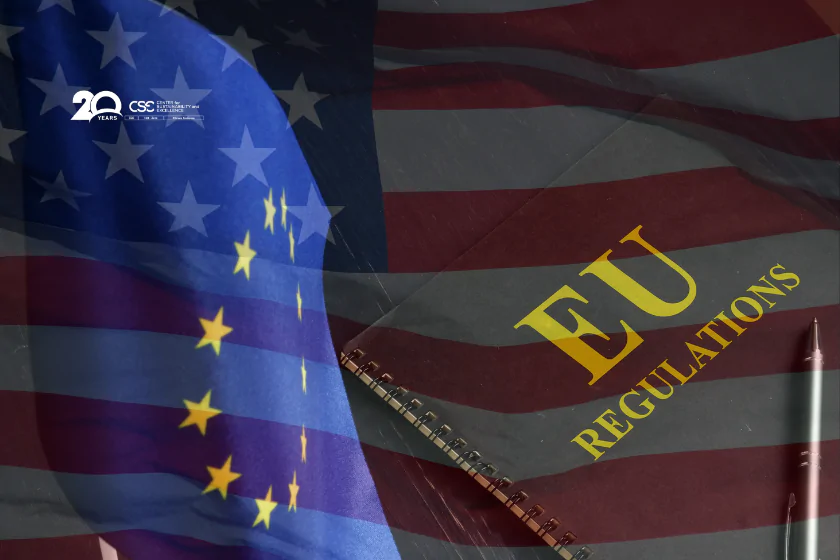The European Union’s ESG regulatory framework is no longer just a European concern. Over 4,000 U.S. companies now fall under the EU’s sustainability disclosure and due diligence mandates, specifically through the Corporate Sustainability Reporting Directive (CSRD) and the Corporate Sustainability Due Diligence Directive (CSDDD). As cross-border regulations tighten, U.S. companies engaged in European markets or supply chains must adapt—or risk losing market access and credibility.
Why U.S. Companies Are Now Within the EU’s ESG Scope
The CSRD, effective January 2024, expands sustainability reporting obligations to non-EU companies generating more than €150 million in annual revenue within the EU. Additionally, U.S. companies with large subsidiaries or securities listed on EU-regulated markets are directly impacted.
The CSDDD, although still in development, imposes due diligence requirements across entire value chains, requiring companies to identify and mitigate human rights and environmental risks. Together, these frameworks redefine global supply chain expectations.
According to the Harvard Law School Forum on Corporate Governance, this is part of the EU Omnibus Package, which aims to streamline ESG reporting across borders, making it harder for non-compliant companies to operate within the EU economy.
The Latest EU Update: Simplifying CSRD Standards
In July 2025, the EU agreed to extend the deadline for developing simplified CSRD sustainability reporting standards for non-EU companies, especially those with fewer resources. While the core reporting obligations remain stringent, the simplified standards will offer more tailored guidance for non-European entities.
This extension provides U.S. companies with more time to align their ESG reporting, but the transparency expectations remain high. Companies must still comply with the European Sustainability Reporting Standards (ESRS), which set detailed requirements for sustainability disclosures.
Key Compliance Requirements for U.S. Companies
For U.S. entities affected by the EU ESG regulations, the primary requirements include:
-
Comprehensive ESG Reporting aligned with the ESRS, covering climate impact, social factors, governance structures, and sustainability risks.
-
Double Materiality Assessment, considering both how sustainability issues affect the company and how the company impacts the environment and society.
-
Supply Chain Due Diligence, ensuring responsible practices throughout the value chain, from raw materials to end products.
-
Third-party Assurance, requiring independent verification of ESG data disclosed under the CSRD.
Industries Most Affected
Industries with global supply chains—such as manufacturing, technology, energy, and retail—face the greatest exposure. Tech giants with European subsidiaries and manufacturers sourcing from developing countries must scrutinize their suppliers for ESG compliance under EU expectations.
Additionally, private equity firms and investors are increasingly examining portfolio companies for ESG readiness, as non-compliance can lead to legal, reputational, and financial risks.
Practical Steps for U.S. Companies
-
Conduct a Gap Analysis: Assess current ESG practices against CSRD and CSDDD requirements.
-
Develop ESG Reporting Capacity: Establish systems for robust data collection, reporting, and assurance.
-
Strengthen Supply Chain Oversight: Implement due diligence frameworks addressing environmental and social risks throughout the supply chain.
-
Train Leadership Teams: Build internal awareness and expertise on the implications of EU ESG regulations.
-
Engage in ESG Capacity Building: Professionals can upskill through certified ESG training programs to ensure compliance and competitive advantage.
Strategic Opportunities Beyond Compliance
While compliance is essential, the EU ESG regulations impact U.S. companies by also presenting strategic opportunities. Transparent ESG practices can:
-
Enhance brand reputation in Europe and globally.
-
Attract ESG-conscious investors and partners.
-
Boost supply chain resilience through sustainability-driven practices.
-
Prepare companies for future U.S. regulations, including potential ESG disclosure rules from the SEC.
Final Thoughts
The EU’s evolving ESG framework signifies a paradigm shift in global corporate governance. Over 4,000 U.S. companies now face ESG obligations that could reshape their operations, reporting, and supply chain management.
For sustainability professionals, this regulatory convergence is a pivotal moment to enhance skills and prepare organizations for global ESG compliance. TheCertified Sustainability Practitioner Program offers specialized training to equip leaders for this new era of transparency and accountability.







